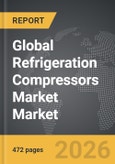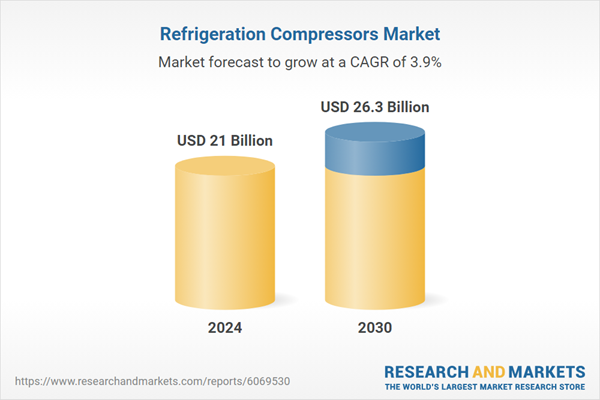Global Refrigeration Compressors Market - Key Trends & Drivers Summarized
Why Are Refrigeration Compressors the Backbone of Modern Cooling Systems?
Refrigeration compressors are the heart of any cooling system, playing a critical role in industries such as food and beverage, pharmaceuticals, HVAC, and industrial refrigeration. These devices work by compressing refrigerant gases, increasing their temperature and pressure before cooling them to facilitate heat exchange. The demand for refrigeration compressors has surged due to rising urbanization, increasing food safety concerns, and the expansion of cold storage facilities worldwide. The need for temperature-sensitive logistics, particularly in the pharmaceutical and vaccine distribution sector, has further highlighted the significance of efficient refrigeration systems. In the food retail industry, supermarkets, hypermarkets, and convenience stores are investing heavily in energy-efficient refrigeration solutions to reduce operational costs and comply with stringent environmental regulations. Additionally, the rising popularity of frozen and ready-to-eat meals has fueled the expansion of commercial refrigeration, increasing demand for advanced compressor technologies that enhance efficiency and sustainability.How Are Technological Innovations Enhancing the Performance of Refrigeration Compressors?
Advancements in compressor technology have transformed the refrigeration industry, making cooling systems more energy-efficient, durable, and environmentally friendly. The shift toward variable-speed compressors, which adjust cooling capacity based on demand, has significantly reduced energy consumption and operational costs. Inverter-driven compressors are gaining traction due to their ability to optimize performance while minimizing temperature fluctuations, ensuring consistent cooling in commercial and industrial applications. The adoption of natural refrigerants such as CO2 (R744), ammonia (R717), and hydrocarbons is reshaping the market as companies move away from high-global-warming-potential (GWP) refrigerants. Additionally, AI-powered predictive maintenance and IoT-enabled monitoring systems are helping businesses track compressor efficiency, detect potential failures, and optimize performance in real-time. With smart automation becoming a key focus, refrigeration compressors are evolving to meet the growing demands of energy-conscious industries, paving the way for sustainable and cost-effective cooling solutions.What Market Trends Are Driving the Growth of the Refrigeration Compressors Industry?
The rapid expansion of cold chain logistics and e-commerce-driven grocery delivery services has accelerated demand for high-performance refrigeration compressors. As consumers increasingly rely on online grocery shopping and meal kit deliveries, retailers are expanding their refrigerated warehouse networks, leading to higher investments in industrial refrigeration systems. The HVAC industry is also experiencing a surge in demand for eco-friendly and high-efficiency air conditioning solutions, propelling the adoption of next-generation compressors. Additionally, government policies promoting energy efficiency and carbon footprint reduction are pushing manufacturers to innovate with low-GWP refrigerants and advanced compressor designs. The increasing focus on modular and compact refrigeration units in commercial applications is another key trend, allowing businesses to optimize space utilization while maintaining high cooling efficiency. As climate change concerns drive the need for resilient refrigeration systems, industries are prioritizing investments in sustainable compressor technologies to future-proof their operations.What Are the Key Growth Drivers of the Refrigeration Compressors Market?
The growth in the global refrigeration compressors market is driven by several factors, including the increasing demand for cold storage solutions, the rapid expansion of food retail and pharmaceutical industries, and advancements in energy-efficient refrigeration technologies. The rising need for sustainable cooling solutions has accelerated the adoption of eco-friendly refrigerants and variable-speed compressor systems. Additionally, the shift toward smart monitoring and AI-based predictive maintenance is enhancing compressor efficiency, reducing downtime, and optimizing energy consumption. The expansion of urban infrastructure, coupled with growing investments in green building initiatives, is further supporting market growth. Moreover, the rise of stringent environmental regulations and carbon emission reduction targets is pushing manufacturers to develop innovative, high-performance refrigeration compressors. As industries continue to prioritize energy efficiency, cost savings, and regulatory compliance, the refrigeration compressors market is expected to experience sustained growth, driving the evolution of next-generation cooling solutions worldwide.Report Scope
The report analyzes the Refrigeration Compressors market, presented in terms of market value (US$). The analysis covers the key segments and geographic regions outlined below:- Segments: Compressor Type (Reciprocating Compressor, Scroll Compressor, Screw Compressor); Capacity (Upto 5 Hp, 5 - 10 Hp, 10 - 15 Hp, Above 15 Hp); Motor (Fixed Speed Compressor, Variable Speed Compressor); Application (Residential, Commercial, Industrial).
- Geographic Regions/Countries: World; United States; Canada; Japan; China; Europe (France; Germany; Italy; United Kingdom; Spain; Russia; and Rest of Europe); Asia-Pacific (Australia; India; South Korea; and Rest of Asia-Pacific); Latin America (Argentina; Brazil; Mexico; and Rest of Latin America); Middle East (Iran; Israel; Saudi Arabia; United Arab Emirates; and Rest of Middle East); and Africa.
Some of the 43 companies featured in this Refrigeration Compressors market report include -
- Atlas Copco AB
- Bitzer SE
- Bristol Compressors International LLC
- Burckhardt Compression AG
- Carlyle Compressors
- Carrier Global Corporation
- Daikin Industries, Ltd.
- Danfoss Group
- Dorin S.p.A.
- Embraco (a Nidec brand)
- Emerson Electric Co.
- Frascold S.p.A.
- Fusheng Industrial Co., Ltd.
- GEA Group AG
- GMCC (Guangdong Meizhi Compressor Co., Ltd.)
- Hanbell Precise Machinery Co., Ltd.
- Huayi Compressor Co., Ltd
- Johnson Controls-Hitachi Air Conditioning
- Kulthorn Kirby Public Company Limited
- LG Electronics
Key Insights:
- Market Growth: Understand the significant growth trajectory of the Reciprocating Compressor segment, which is expected to reach US$16.4 Billion by 2030 with a CAGR of a 4.4%. The Scroll Compressor segment is also set to grow at 3.2% CAGR over the analysis period.
- Regional Analysis: Gain insights into the U.S. market, valued at $5.7 Billion in 2024, and China, forecasted to grow at an impressive 7.2% CAGR to reach $5.4 Billion by 2030. Discover growth trends in other key regions, including Japan, Canada, Germany, and the Asia-Pacific.
Why You Should Buy This Report:
- Detailed Market Analysis: Access a thorough analysis of the Global Refrigeration Compressors Market, covering all major geographic regions and market segments.
- Competitive Insights: Get an overview of the competitive landscape, including the market presence of major players across different geographies.
- Future Trends and Drivers: Understand the key trends and drivers shaping the future of the Global Refrigeration Compressors Market.
- Actionable Insights: Benefit from actionable insights that can help you identify new revenue opportunities and make strategic business decisions.
Key Questions Answered:
- How is the Global Refrigeration Compressors Market expected to evolve by 2030?
- What are the main drivers and restraints affecting the market?
- Which market segments will grow the most over the forecast period?
- How will market shares for different regions and segments change by 2030?
- Who are the leading players in the market, and what are their prospects?
Report Features:
- Comprehensive Market Data: Independent analysis of annual sales and market forecasts in US$ Million from 2024 to 2030.
- In-Depth Regional Analysis: Detailed insights into key markets, including the U.S., China, Japan, Canada, Europe, Asia-Pacific, Latin America, Middle East, and Africa.
- Company Profiles: Coverage of players such as Aaren Scientific, Alcon Inc., AMETEK, Inc., Avedro, Inc., Bausch + Lomb Incorporated and more.
- Complimentary Updates: Receive free report updates for one year to keep you informed of the latest market developments.
Select Competitors (Total 43 Featured):
- Atlas Copco AB
- Bitzer SE
- Bristol Compressors International LLC
- Burckhardt Compression AG
- Carlyle Compressors
- Carrier Global Corporation
- Daikin Industries, Ltd.
- Danfoss Group
- Dorin S.p.A.
- Embraco (a Nidec brand)
- Emerson Electric Co.
- Frascold S.p.A.
- Fusheng Industrial Co., Ltd.
- GEA Group AG
- GMCC (Guangdong Meizhi Compressor Co., Ltd.)
- Hanbell Precise Machinery Co., Ltd.
- Huayi Compressor Co., Ltd
- Johnson Controls-Hitachi Air Conditioning
- Kulthorn Kirby Public Company Limited
- LG Electronics
This edition integrates the latest global trade and economic shifts into comprehensive market analysis. Key updates include:
- Tariff and Trade Impact: Insights into global tariff negotiations across 180+ countries, with analysis of supply chain turbulence, sourcing disruptions, and geographic realignment. Special focus on 2025 as a pivotal year for trade tensions, including updated perspectives on the Trump-era tariffs.
- Adjusted Forecasts and Analytics: Revised global and regional market forecasts through 2030, incorporating tariff effects, economic uncertainty, and structural changes in globalization. Includes historical analysis from 2015 to 2023.
- Strategic Market Dynamics: Evaluation of revised market prospects, regional outlooks, and key economic indicators such as population and urbanization trends.
- Innovation & Technology Trends: Latest developments in product and process innovation, emerging technologies, and key industry drivers shaping the competitive landscape.
- Competitive Intelligence: Updated global market share estimates for 2025, competitive positioning of major players (Strong/Active/Niche/Trivial), and refined focus on leading global brands and core players.
- Expert Insight & Commentary: Strategic analysis from economists, trade experts, and domain specialists to contextualize market shifts and identify emerging opportunities.
Table of Contents
Companies Mentioned (Partial List)
A selection of companies mentioned in this report includes, but is not limited to:
- Atlas Copco AB
- Bitzer SE
- Bristol Compressors International LLC
- Burckhardt Compression AG
- Carlyle Compressors
- Carrier Global Corporation
- Daikin Industries, Ltd.
- Danfoss Group
- Dorin S.p.A.
- Embraco (a Nidec brand)
- Emerson Electric Co.
- Frascold S.p.A.
- Fusheng Industrial Co., Ltd.
- GEA Group AG
- GMCC (Guangdong Meizhi Compressor Co., Ltd.)
- Hanbell Precise Machinery Co., Ltd.
- Huayi Compressor Co., Ltd
- Johnson Controls-Hitachi Air Conditioning
- Kulthorn Kirby Public Company Limited
- LG Electronics
Table Information
| Report Attribute | Details |
|---|---|
| No. of Pages | 472 |
| Published | January 2026 |
| Forecast Period | 2024 - 2030 |
| Estimated Market Value ( USD | $ 21 Billion |
| Forecasted Market Value ( USD | $ 26.3 Billion |
| Compound Annual Growth Rate | 3.9% |
| Regions Covered | Global |









